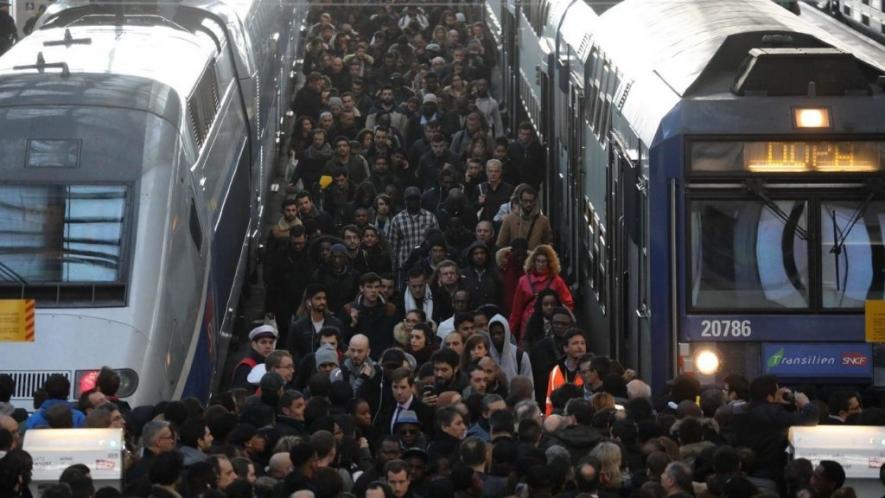The Fight of French Railway-Workers is Also a Fight For Railway-Passengers

Image Courtesy: Ludovic Marin / AFP/ Getty Images
The rail workers’ strike, which rocked France on April 3-4, is only a prelude to the wave of unrest that is likely to sweep the country over the coming months. In addition to the rail workers, who plan a series of rolling strikes, energy workers and students too are likely to go on the offensive against the series of anti-labour reforms Emmanuel Macron’s government has been undertaking. The latest is an attempt to remove the special status of railway employees and to take the first step towards privatization of railways.
While some train lines remained totally closed, one in eight high speed trains (TGVs), one in five regional trains and a fourth of suburban rails in Paris ran as usual. All trains plying between France and Switzerland, Italy and Spain were cancelled. Only half of the Eurostar trains connecting France and the U.K. were operational. Air traffic was also disrupted as Air France workers staged a walkout on Tuesday, demanding a 6% hike in their pay, which has remained unchanged since 2011.
All the major trade unions – the CGT, CFDT, SUD-rail and UNSA – backed the strike, which saw the participation of around 51,000 employees of SNCF (the state-owned national railways). The striking employees included 77% of conductors and 48% of employees regarded as “indispensable to the circulation of trains”.
While the Macron government issued the usual condemnations, its attempts to paint the strikers as ‘privileged’ workers whose demands are antithetical to the interests of the passengers and the public at large does not seem to be working. According to a recent poll, the percentage of people who thought the strike was justified rose from 42% last month to 46%.
The strikes will continue, with the next round scheduled for April 8-9. Until June 28, SNFC workers will continue to strike for two consecutive days out of every five unless President Macron rolls back the proposed reforms to the national railways. The government has claimed that the reforms aim at addressing the $57 million debt accumulated by the SNFC but unions charge that they are actually aimed at disenfranchising employees and laying the groundwork for privatization.
One of the targets of the proposed reforms is the “Statut de Cheminot” – the contract under which almost 90% of SNFC staff are employed. This contract accords them a high degree of job security as they cannot be fired as part of improving the company’s margins. Resignation, retirement or health issues are the only grounds on which a worker’s service ends. The proposed reforms moot a new contract – the Code du Travail – which does not provide any of these securities to the employees.
The reforms also propose changing the legal status of the SNFC from a ‘public company’ to a ‘publicly financed corporation’, which, many fear, is the first step towards total privatization. While the President has denied this, SNFC employees are wary as the status of France Telecom was changed similarly as a prelude to fully privatizing it.
“Macron’s government says the SNCF, which is losing 3 billion euros a year, needs to change radically to deal with competition when the network monopoly starts to end in 2020, in line with liberalisation rules agreed at the European Union level,” Reuters reported.
However, according to the report produced by the company on February 27, SNFC’s revenue in 2017 increased by 4.2%, generating a total of 33.5 billion euros. The company’s EBITA (Earnings before interest, taxes, depreciation and amortization) has seen an overall increase of 16%. Individual subsidiaries of SNFC have also registered growth.
While the report also acknowledges that this growth is “insufficient” since the company’s infrastructure division SNCF Réseau’s debt has increased by 3.8% year after year, accumulating a ‘massive’ 46.6 billion euros (57 billion dollars), it is not clear how privatization can address the problem. Five years after privatization was complete, the debt accumulated by Britain’s railway service provider, Network Rail, began to soar from just under 9,636 million pounds in 2002-03 to 46.3 billion pounds (64.9 billion dollars) last year. By 2019, it is projected that the figure will rise to 52 billion pounds (72.9 billion dollars).
It is not only the railway workers who will be affected by the threat of privatization that looms over the French national railways, whose financial state has been improving and whose services are regarded as the best in Europe. If private corporations are allowed to capture this essential national service, then price-rise, cost-cutting exercises by reducing quality or circulation of trains in low revenue generating areas etc, will all be justified in the pursuit of profit. This is bound to adversely affect not only the employees but also the country’s 4.5 million train passengers, whom President Macron is attempting to pit against the striking workers by calling the strikes a violation of the passengers’ “constitutional freedom” to travel.
Get the latest reports & analysis with people's perspective on Protests, movements & deep analytical videos, discussions of the current affairs in your Telegram app. Subscribe to NewsClick's Telegram channel & get Real-Time updates on stories, as they get published on our website.
























